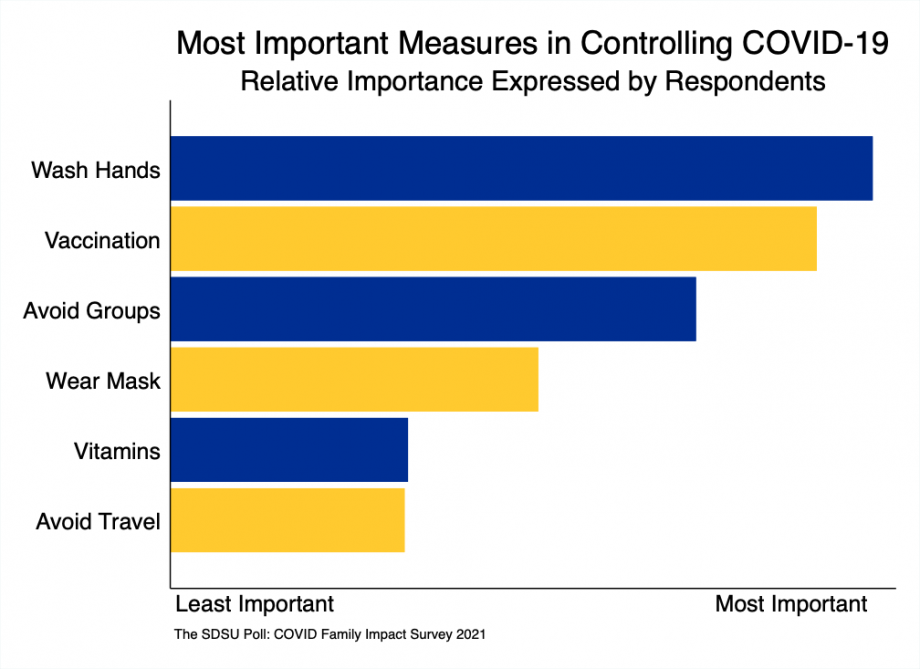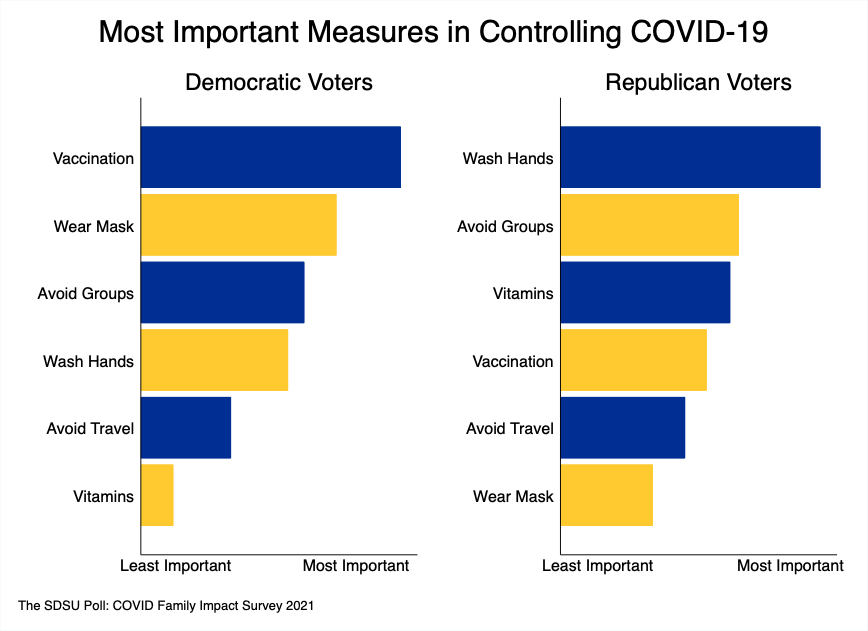The South Dakota COVID-19 Family Impact Survey 2021 was conducted from July 31 to Aug. 14, 2021 by The South Dakota Polling Project, a research group housed in the School of American and Global Studies at South Dakota State University. This survey builds upon similar surveys conducted by The South Dakota Polling Project in October 2020 and April 2021. In this poll, a total of 573 registered voters in South Dakota answered questions about the impact of the COVID-19 pandemic on their daily lives. The margin of error of this survey was +/- 4 %, on par with other state-wide polls.
Overall, Hand Washing and Vaccination are Seen as the Most Important Preventative Measures
Given the seriousness of the COVID-19 virus, scientists and public health officials recommended multiple mitigation measures to stop its spread. Vaccination is considered the most important measure to stop the spread of the virus and to bring the pandemic under control. For this reason, vaccines have been available to the public at no costs in South Dakota since the spring of this year. However, which approaches do South Dakotans consider to be most important? There is a lot of misinformation and conspiracy theories regarding the COVID-19 virus on the internet and social media, which experts blame for soft vaccination rates. As we previously reported, strong vaccine hesitancy exists in the state, though not as strong as in the American South. As a part of the poll, we presented participants with several COVID-19 mitigation measures and asked them to rank these measures in terms of their importance in bringing the COVID-19 pandemic under control.

Overall, South Dakotans consider frequent hand washing and vaccination to be the most important measures against COVID-19. Avoiding large groups and wearing masks in indoor public places are middling. While taking vitamins and limiting travel are considered to be least important. These results uncover a large gap between the beliefs of the public and scientists regarding COVID-19 mitigation. The Center for Disease Control and Prevention advises that the virus spreads primarily through breathing in air that was exhaled by an infected person. For this reason, the CDC emphasizes the importance of vaccination, wearing a mask, and social distancing over the other efforts. Nevertheless, frequent hand washing is considered by the public to be the most important, perhaps due to being the least intrusive of the other measures and requiring the smallest of change to daily routines. However, these overall numbers hide an important division in the electorate.
The Partisan Gap on Mitigation
As we have consistently reported, virtually all aspects of the COVID-19 pandemic and our policy responses have become politicized. For this reason, we look at what approaches Republicans and Democrats in South Dakota deem most important in bringing the pandemic under control. We find that Democrats consider vaccination, masks and social distancing to be the most important measures against COVID-19. It is noteworthy that vaccination was ranked first by a large margin, with mask wearing closely behind. On the other hand, Republicans consider hand-washing the most efficacious by a large margin, followed by social distancing and taking vitamins. Vaccination is fourth on the list and mask-wearing is perceived the least important. These differences illustrate the extent to which political divisions shape COVID-19 mitigation attitudes. While Democratic Party leadership has generally embraced the advice of scientists and public health officials, many prominent Republican politicians have repeatedly downplayed the severity of the pandemic and sharply criticized policies aimed at mandating masks or vaccination. It is clear that South Dakotans are taking cues from their parties, shaping their attitudes towards the perceived efficacy of COVID-19 mitigation measures. These results help to explain why vaccination rates among Republicans are much lower than among Democrats in South Dakota.

In our next press release we will examine people’s preferences on how best to encourage individuals to get a COVID-19 vaccination.
Contributors: Filip Viskupic PhD, David Wiltse PhD & Abdallah Badahdah PhD
- Contact:
- Telephone number: 605-688-6367
Republishing
You may republish SDSU News Center articles for free, online or in print. Questions? Contact us at sdsu.news@sdstate.edu or 605-688-6161.

